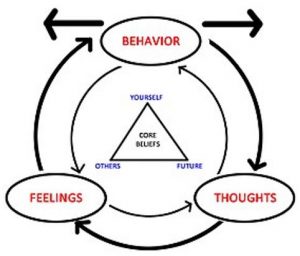cognitive behavioral therapy

Cognitive behavioral therapy is a psycho-social intervention that aims to improve mental health. CBT focuses on challenging and changing unhelpful cognitive distortions (e.g. thoughts, beliefs, and attitudes) and behaviors, improving emotional regulation, and the development of personal coping strategies that target solving current problems. Originally, it was designed to treat depression, but its use has been expanded to include treatment of a number of mental health conditions, including anxiety.
CBT is a “problem-focused” and “action-oriented” form of therapy, meaning it is used to treat specific problems related to a diagnosed mental disorder. The therapist’s role is to assist the client in finding and practicing effective strategies to address the identified goals and decrease symptoms of the disorder. CBT is based on the belief that thought distortions and maladaptive behaviors play a role in the development and maintenance of psychological disorders, and that symptoms and associated distress can be reduced by teaching new information-processing skills and coping mechanisms.
This diagram depicts how emotions, thoughts, and behaviors all influence each other. The triangle in the middle represents CBT’s tenet that all humans’ core beliefs can be summed up in three categories: self, others, future.
